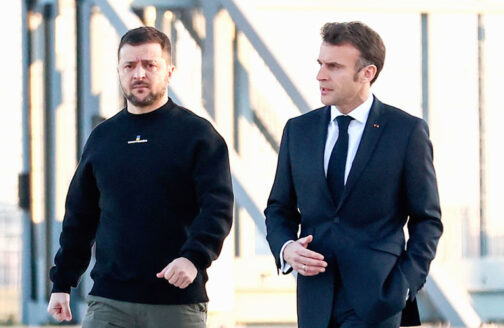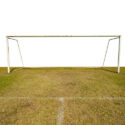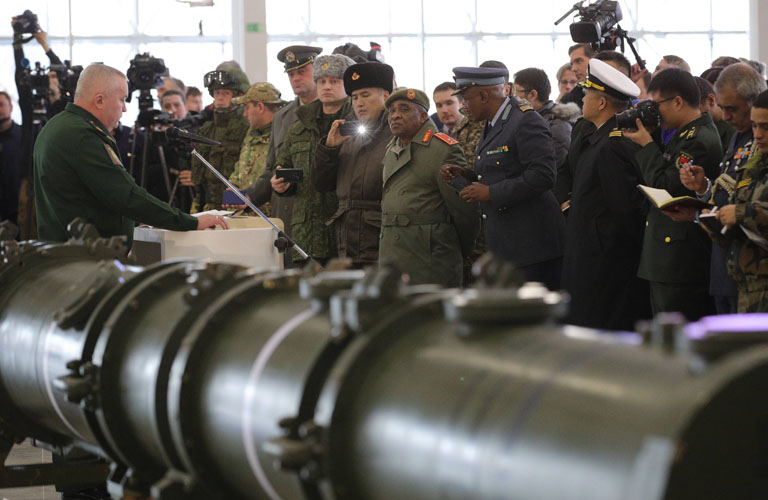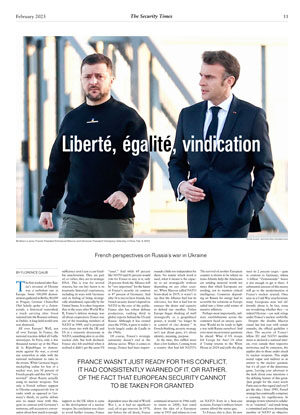Liberté, égalité, vindication
 Brothers in arms: French President Emmanuel Macron and Ukrainian President Volodymyr Zelensky in Paris, Feb. 9, 2023.
Brothers in arms: French President Emmanuel Macron and Ukrainian President Volodymyr Zelensky in Paris, Feb. 9, 2023.
Credit: picture alliance / ASSOCIATED PRESS | Mohammed Badra
French perspectives on Russia’s war in Ukraine
The first weekend after Russia’s invasion of Ukraine was a turbulent one in Europe. Some 100,000 demonstrators gathered in Berlin, 80,000 in Prague; German Chancellor Olaf Scholz spoke of a Zeitenwende, a historical watershed; a truck carrying altar bread rammed into the Russian embassy in Dublin. A long-held world view was shattered.
All over Europe? Well, not all over Europe. In France, the national reaction defied all Gallic stereotypes. In Paris, only a few thousand turned up at the Place de la République to demonstrate against the war, a crowd size somewhat at odds with the national inclination to take to the streets. While Germans began stockpiling iodine for fear of a nuclear war, just 30 percent of French people said they felt “very worried” about Russia actually using its nuclear weapons. Not only is French military support to Ukraine comparatively low (it ranks tenth as opposed to Germany’s third), its public debate sees no major issue with this, quite in contrast with Germany’s torturous, self-accusatory conversation about how much is enough. In this light, the fact that French President Emmanuel Macron continued to speak to Russian President Vladimir Putin on the phone, and voiced doubts about Ukrainian NATO membership, was seen by some as breaking ranks with Ukraine. It almost seemed that what was historic everywhere else was not historic in France.
But reading it this way would be to thoroughly misread France and how it understands strategy, security and defense. As Macron said in his initial reaction to the invasion: France not only saw this coming, it’s ready for it.
There are broadly two reasons for this. First, France can afford to be less anxious than some of its European partners because it invested early on in – you guessed it – autonomy. Often misunderstood – not to say belittled – by others, French desires for self-sufficiency aren’t just a cute Gaullist anachronism. They are part of, or rather, they are its strategic DNA. This is true for several reasons, but one key factor is its traumatic historical experiences, including its wars with Germany and its feeling of being strategically abandoned, especially by the United States. It is often forgotten that in the years after World War II, France’s defense strategy was all about cooperation. France was one of the founding members of NATO in 1949, and it proposed even closer ties with the UK and US in a tripartite directorate in NATO, something akin to an elite nuclear club. But both declined. France also felt snubbed when it realized it didn’t get the same US support as the UK when it came to the development of a nuclear weapon. Its conclusion was clear: to avoid further trauma, France had to be in a position to take care of its own security needs. It went ahead and developed its nuclear weapon without the US, although assistance from Washington finally trickled in a decade later. Today, France is the only nuclear power in the European Union and ranks almost on par with China with its 280 warheads.
France also continued to maintain its military posture. Although its defense spending fell like all of its neighbors’ in the early 2000s, it always hovered around the 2 percent of GDP agreed to by NATO allies in 2006, making it one of the few to meet this target before the war. In part, this is because its successive governments never faced the hostility that is so common across the Rhine when it comes to all things military: 86 percent of French have a positive image of their armed forces, and 81 percent think of nuclear weapons as an “asset.” And while 69 percent like NATO and 81 percent would vote for France to stay in it, only 24 percent think the Alliance will be “very important” for the future of France’s security (in contrast to 47 percent of Germans). And why? It is nice to have friends, but French security doesn’t depend on NATO in the eyes of the public. France also has robust defense production, ranking third in global exports behind the US and Russia. Although it has existed since the 1930s, it grew to today’s levels largely under de Gaulle in the 1960s.
Of course, France’s strategic autonomy doesn’t end in the defense sector. When it comes to energy, France had been import-dependent since the end of World War I, as it had no significant coal, oil or gas reserves. In 1970, just before the oil shock, France imported three-quarters of its energy needs. The 1973 Arab export embargo in protest against European support to Israel during the Yom Kippur War hit hard when fuel prices increased five-fold. The year after, France launched its massive program to expand nuclear energy, which has proven to be its savior ever since. When the war in Ukraine began, France was autonomous in terms of electricity production, and Russia filled just 17 percent of its gas needs (in comparison to 55 percent in Germany).
But France wasn’t just ready for this conflict, it had consistently warned of it, or rather, of the fact that European security cannot to be taken for granted, and requires rethinking. In 2017, Macron famously called for European strategic autonomy, or sovereignty, as Germany and others prefer to call it, as autonomy sounds a little too independent for them. No matter which word is used, what it means is the capacity to act strategically without depending on any other country. When Macron called NATO brain-dead in 2019, it wasn’t to say that the Alliance had lost its relevance, but that it had lost its essence: the desire and capacity to defend one another. Unless Europe began thinking of itself strategically as a geopolitical power, it would “no longer be in control of (its) destiny.” In French thinking, security strategy isn’t just about guns, it’s about identity, meaning, purpose.
At the time, this ruffled more than a few feathers. Coming from a country that had left NATO’s command structure in 1966 (only to return in 2008), had voted down the idea of a European army in 1955 and refuses to even attend the NATO nuclear planning group, this was rich. It was read as France wanting to promote its anti-trans-Atlantic agenda, to replace NATO with the European Union and to impose on others its obsession with autonomy.
But today, France stands vindicated. The Ukraine moment might be cause for hoorah as it showcases a moment of Western unity, while also glaringly exposing its vulnerabilities. Without the US, Ukraine’s military would no longer exist. The survival of another European country is shown to be reliant on trans-Atlantic help: the Americans are sending material worth ten times that which Europeans are sending, not to mention critical intelligence. Countries depending on Russia for energy had to scramble for solutions as Europe sailed into a bitter cold winter of massive inflation.
Perhaps most importantly, military establishments across the continent faced an uneasy question: Would we be ready to fight a war with Russia ourselves? And even more inconvenient questions lie ahead: What if US troops left Europe for Asia? Or what if Trump returns to the White House in 2024 and pulls the plug on NATO? Even in a best-case scenario, Europe’s military future cannot afford the status quo.
To France, this is clear. Its new National Strategic Review isn’t fundamentally different from that of 2017 – after all, France was right in its assessment – but it ups the ante. Now France is warning to prepare for high-intensity conflicts, for a US pivot to Asia, for an aggressive China and, of course, Russia. “We need to be one war ahead,” Macron says, and the French military take him for his word. La Red Team, a project underway since 2019 that involves science fiction writers, is imagining all kinds of future wars to challenge how the armed forces think of future battlegrounds. Strategic foresight – still an underused or unknown tool in many European strategic circles – is part and parcel of how French defense intends to meet the future. France also puts its money where its mouth is: It has just increased its military budget by a third, and will continue to meet its 2 percent target – quite in contrast to Germany, whose €1-billion *Zeitenwende* bonus is not enough to get it there. A substantial amount of this money will go to the modernization of France’s nuclear arsenal. Once seen as a Cold War anachronism, many Europeans now feel differently about it. In fact, many are wondering whether they – or indeed Ukraine – can seek refuge under France’s nuclear umbrella.
Despite the doubts Macron raised late last year with certain remarks, the official guideline is clear: The security of France’s fellow EU and NATO member states is declared a national interest, even outside their respective territories; and by extension, this applies also to those under attack by nuclear weapons. This might sound vague and indirect as an answer to the nuclear question, but it’s all part of the deterrence game. Leaving your adversary in the dark about your intentions is the defining feature of this game. (Just google for the exact words Putin uses in this regard and you’ll get the idea.) Since 1945, French strategy has continually comprised a yearning for togetherness. Its strategic review referred to solidarity as “essential,” and made being a committed and even demanding member of NATO an objective, hence dispelling the suspicions of its secret project to replace it with a European Army. While France may not need allies the way others do, it still wants them very much. But its problem in this regard isn’t the US, it’s its fellow Europeans who have been slow to wake up to the reality France has been warning of. Supporting and pushing for European strategic autonomy is therefore another explicit goal of the strategic review. This doesn’t mean France has no homework to do, especially when it comes to Ukraine. It could send more weapons – 70 percent of French support this – or be more vocal about what it is sending. It could also make more explicit its desire to abandon its traditional position as “balancing power” when it comes to Ukraine. But one thing is for sure: it will never cease in its quest to awaken other Europeans to the future it has envisaged.
Florence Gaub is a Franco-German researcher, security expert and futurist. She is the author of several books and is the president and founder of the Futurate Institute, a non-profit dedicated to all things future.




